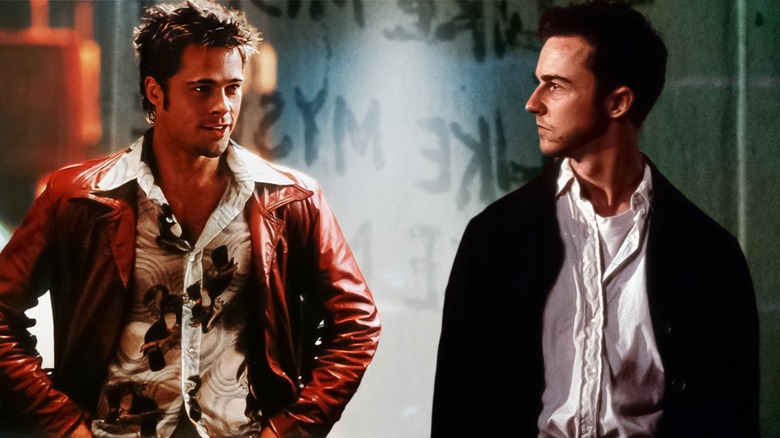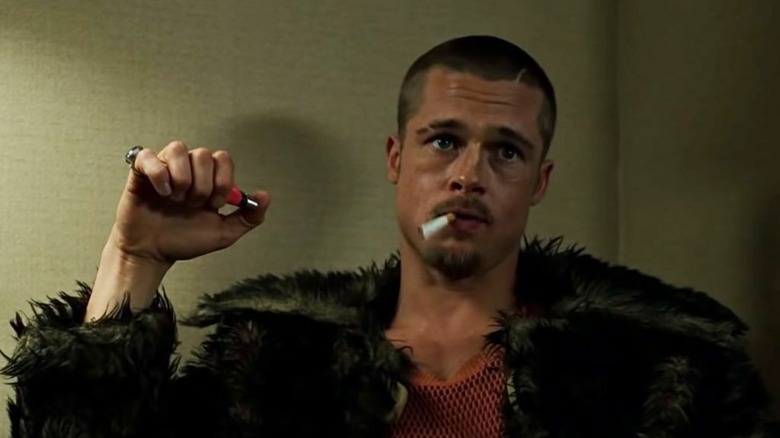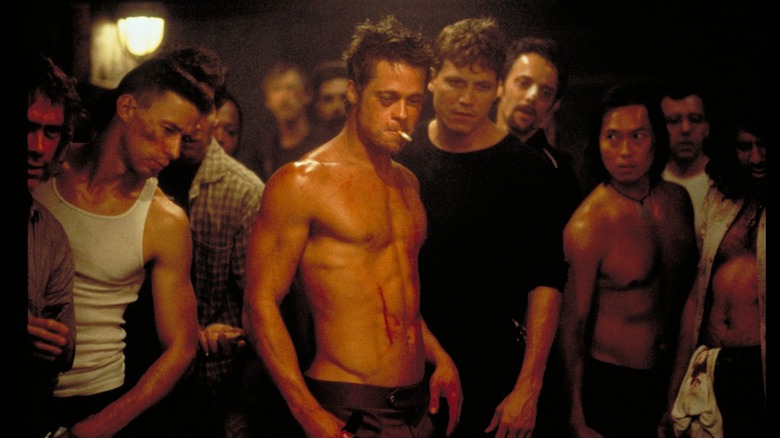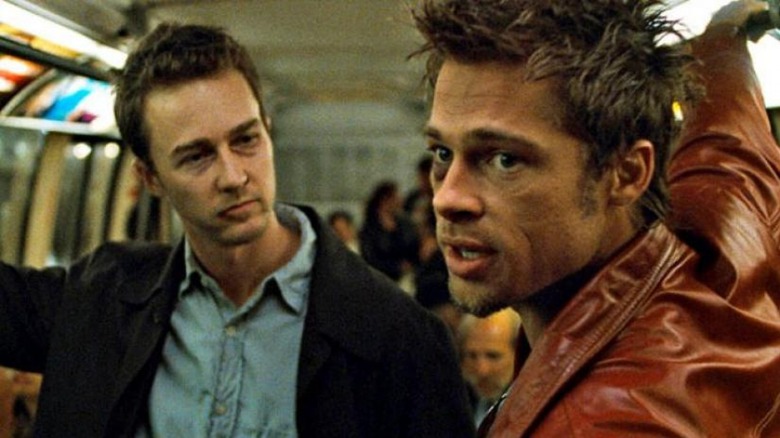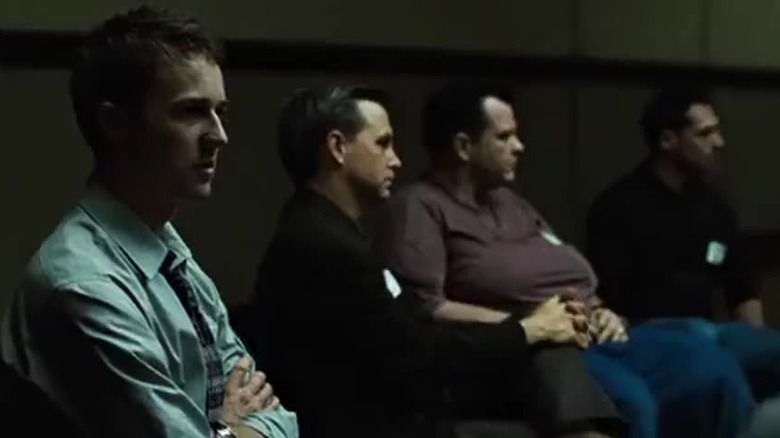David Fincher's Fight Club Was A Warning, Not A Call To Arms
This article breaks the first and second rules of "Fight Club" and contains spoilers.
The protagonist of David Fincher's 1999 film "Fight Club," based on the 1996 Chuck Palahniuk novel of the same name, is still incredibly relatable. Alternately called "The Narrator" or "Jack," based on his jokes from the perspective of a man named Jack's organs and body parts, he's a sad sack of a man in a dead-end cubicle job with a boss who drives him nuts. Played by Edward Norton with a perpetual frown, he's miserable and tries to buy things to fill the hole in his soul, lying awake at night staring at informercials in the throes of insomnia. Anyone who's ever had a crummy job and felt like their life was going nowhere can sympathize with poor Jack. It's easy to see how he's seduced into a cult by the charismatic and enigmatic Tyler Durden (Brad Pitt), who he meets on a long flight and ends up forming an underground fight club with. What's frustrating is that too many audiences are enchanted by Tyler's words themselves.
In tough times, people tend to turn to anyone who can give them purpose and a sense of belonging. Tyler's rules, fight clubs, and later Project Mayhem cater to men who have felt emasculated and abandoned by society in some way, and it's terrifying to see how online personalities and influencers are using the same tactics to recruit angry and afraid men. As intoxicating as some of Tyler's promises might be, "Fight Club" is a warning about sliding into extremism, not an instruction manual for anarchy.
An author's intention
One of the challenges of breaking down the satirical warning elements of "Fight Club" is that the novel's author is pretty ambiguous about the moral implications of Tyler's vision for the world, which promotes that men live strictly according to traditionally masculine ideals. In an interview with Huffington Post, Palahniuk revealed that he doesn't think the novel is a critique or celebration of violent masculinity, because he feels that such violence has purpose in certain confines (like, say, a fight club.) When asked if he felt that fans were misinterpreting the material by taking Tyler at face value, his answer was interesting:
"No, not really. Because they are kind of recognizing the phase where they discover their personal power through acting out against the world."
What Palahniuk describes is a phase I went through around the time I first read and watched "Fight Club," circa 2002 or so when the film was on a free HBO weekend. Tyler's anti-capitalist notions felt revolutionary, and his rejection of working a 9-5 when I was a teenager staring down decades of cubicle work was enticing. As a teenager, "Fight Club" was a part of my personality. It was only a phase, though, because I grew older, learned more, and realized that Tyler's lessons were just as much of a problem as the things it preached against. The anti-capitalism aspect is still worth listening to, but Tyler's misogyny, lack of personal accountability, and penchant for violence are issues that need to be addressed. It's okay to be an apathetic anarchist when you're 16, but not when you're 36.
Lost, angry men
Tyler's concerns about capitalism hold weight, and "the things you own end up owning you" is worth thinking about and taking to heart, but he also spouts nonsense like "We're a generation of men raised by women. I'm wondering if another woman is really the answer we need," which has been quoted by all kinds of men's rights activists and "alpha male" self-help gurus pushing the idea that society is forcing out masculinity and creating a whole generation of effeminate men who are somehow lesser than their forebears. Incels (the "involuntarily celibate") quote the character frequently in an effort to prove that sad, lonely men shouldn't be underestimated. (These same men also love and misinterpret "Taxi Driver," "Joker," and "American Psycho" without a single sliver of self-awareness.)
While Palahniuk has said that he doesn't see the novel's message as gendered (yes, really), some fans had a very strong response to the ideas presented in "Fight Club." The movie version is even more enticing, because who wouldn't want to be 1999 Brad Pitt, with lean muscle, sick thrift store drip, and a whole helluva lot of swagger? He's charming, he's funny, he's impossibly good-looking, and Fincher's much more satirical film gives him plenty of opportunities to be a rebellious and violent masculine ideal. He's Travis Bickle from "Taxi Driver" but with all of the right moves, he's the Joker without clown makeup or desperation. He's the ultimate ideal for lonely men who long for an (imaginary) time when they would be assigned a job, house, and wife when they graduated high school, and he's the template for some of our own world's most toxic public personalities.
Psyched to be space monkeys
It's not news to anyone that America has a real problem with lonely, angry men committing violence. There are many contributing factors to why today's men feel so alienated and aggrieved that need to be addressed at a systemic level, but plenty of people trying to make a buck are ready to try and capitalize on that pain. Using much of the same language as Tyler (but cleverly leaving out the anti-capitalism), media personalities and influencers seek to appeal to men in need of help. Instead of getting mental health support or forming healthy bonds with other adults, they're turning to conspiracy theorists peddling supplements like Alex Jones or influencer and alleged sex trafficker Andrew Tate.
While it might be hard to see the allure of Tate or Jones if you're not buying into what they're selling, it's easy to see Durden's appeal. He's the ultimate cult leader, with a message that appeals to our base instincts and the promise of a found family among the men you fight. Even in death, you will be remembered, with your name chanted by your fellow space monkeys in honor. By understanding how easy it is for young men to slide into ideologies like Tyler's, we can better understand how they are becoming radicalized by men like Tate and Jones and hopefully offer better solutions. Deradicalization is incredibly difficult, but stopping people from going down the wrong path in the first place can be much more doable.
In need of support
The first and second rules of fight club are that the members are not allowed to talk about fight club. The men all do end up telling their friends and co-workers, of course, as the fight clubs grow in size, and there's a camaraderie between them that eventually translates over to their terrorist organization, Project Mayhem. The secrecy serves multiple purposes, including making them feel like they're a part of something exclusive, but it also correlates to how men are expected to deal with life in general. Traditional western rules about masculinity dictate that men aren't supposed to show or share their negative feelings, other than anger, and male companionship has a whole set of norms to avoid being accused of gay tendencies. (Palahniuk, a gay man, absolutely knows what he did when he wrote about a bunch of sweaty, shirtless men slapping their meaty bodies together.) Regardless of gender, people generally want to be heard, accepted, and have physical contact with others, but many men feel that they are prohibited from those things or they won't be perceived as "manly." Before founding the fight clubs, the narrator was visiting support groups for terminal illnesses in order to feel heard, because he believes that when people think you're dying, they finally shut up and listen.
Straight men need healthy outlets for their frustrations and they need the same kinds of support systems that women, queer, and gender non-conforming people have created for themselves without fear of being chastised for having close bonds. Otherwise we're going to keep losing them to the cult of toxic masculinity and its many false prophets, and they're getting louder every day. Remember, guys: you are not your masculinity, and if you want to be a unique and individual snowflake, you can.
